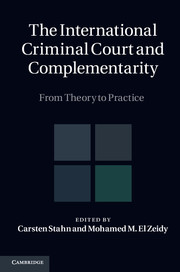Book contents
- Frontmatter
- Contents
- Acknowledgments
- Foreword by HE Judge Sang-Hyun Song
- Foreword by Patricia O’Brien
- Foreword by Silvia A. Fernandez de Gurmendi
- List of abbreviations
- Introduction: bridge over troubled waters?
- PART I General reflections
- PART II Origin and genesis of complementarity
- PART III Analytical dimensions of complementarity
- 7 Complementarity as global governance
- 8 Policy through complementarity: the atrocity trial as justice
- 9 Taking complementarity seriously
- 10 International criminal justice in the era of failed states: the ICC and the self-referral debate
- 11 The quest for constructive complementarity
- 12 Reframing positive complementarity
- 13 Too much of a good thing?: implementation and the uses of complementarity
- PART IV Interpretation and application
- PART IV (Continued) Interpretation and application
- PART V Complementarity in perspective
- PART VI Complementarity in practice
- Index
- References
11 - The quest for constructive complementarity
from PART III - Analytical dimensions of complementarity
Published online by Cambridge University Press: 05 November 2014
- Frontmatter
- Contents
- Acknowledgments
- Foreword by HE Judge Sang-Hyun Song
- Foreword by Patricia O’Brien
- Foreword by Silvia A. Fernandez de Gurmendi
- List of abbreviations
- Introduction: bridge over troubled waters?
- PART I General reflections
- PART II Origin and genesis of complementarity
- PART III Analytical dimensions of complementarity
- 7 Complementarity as global governance
- 8 Policy through complementarity: the atrocity trial as justice
- 9 Taking complementarity seriously
- 10 International criminal justice in the era of failed states: the ICC and the self-referral debate
- 11 The quest for constructive complementarity
- 12 Reframing positive complementarity
- 13 Too much of a good thing?: implementation and the uses of complementarity
- PART IV Interpretation and application
- PART IV (Continued) Interpretation and application
- PART V Complementarity in perspective
- PART VI Complementarity in practice
- Index
- References
Summary
In its early years, the model of a healthy and cooperative synergy between the International Criminal Court (ICC) and domestic states is in danger of being replaced by a model of competition. At present, the Rome Statute obligates States Parties to cooperate with the Court in a variety of ways throughout the investigation and prosecution of persons. Those obligations are not reciprocated by countervailing requirements for the Prosecutor or for the Registry to consult with, much less cooperate with, States Parties. The practice of complementarity may well be the fulcrum supporting the Court's long-term legitimacy; and this principle is all the more important because it is designed to provide intellectual leverage to move non-states parties towards treaty accession. The plain text of Article 1 compels the conclusion that the International Criminal Court was intended to supplement the foundation of domestic punishment for violations of international norms rather than supplant domestic prosecutions. The Statute curtails sovereign authority by displacing domestic trials only in exceptional circumstances, and includes detailed procedural guidance designed to balance sovereign enforcement against improper extensions of ICC prosecutorial power. The Court and States Parties should be joined in a partnership based on mutual respect and a renewed resolve to end impunity. Such a healthy synergy is by no means assured, and could be undermined by any of three emerging trends discussed herein: (i) the extension of judicial constructs beyond those envisioned by states; (ii) an aggressive erosion of complementarity in practice; or (iii) excessive politicization of charging decisions. If the Court habitually overrides the discretion of domestic officials and displaces their authority based on its own preferences or the expediency of political considerations, the entire premise of the complementarity principle will have been eviscerated. States Parties would be wise to address these disquieting signals. This chapter concludes by making a series of specific textual recommendations that in the aggregate would go far towards preventing a crisis of confidence and cooperation that could cripple the Court of the future.
- Type
- Chapter
- Information
- The International Criminal Court and ComplementarityFrom Theory to Practice, pp. 304 - 340Publisher: Cambridge University PressPrint publication year: 2011
References
- 2
- Cited by



